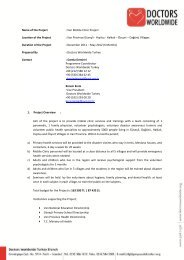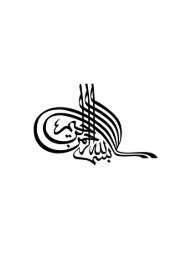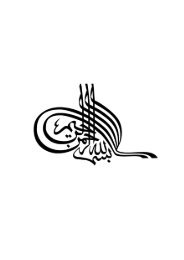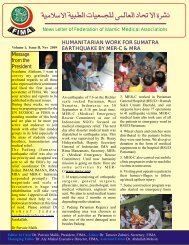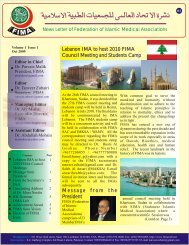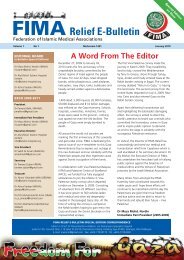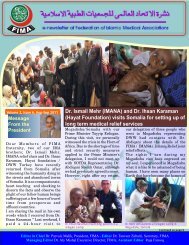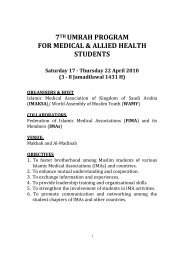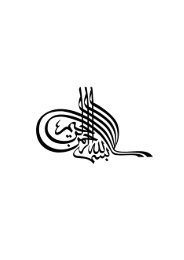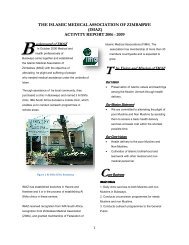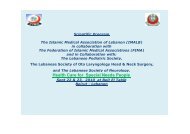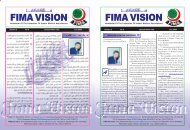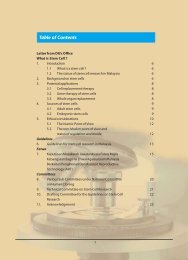FIMA Year Book 2009 - Federation of Islamic Medical Associations
FIMA Year Book 2009 - Federation of Islamic Medical Associations
FIMA Year Book 2009 - Federation of Islamic Medical Associations
Create successful ePaper yourself
Turn your PDF publications into a flip-book with our unique Google optimized e-Paper software.
Inculcating <strong>Islamic</strong> InputGroup A: Patients, prayed for by nameby prayer makers.Group B: Patients not prayed for.The results showed fewer complicationsand less congestive heart failure, lessantibiotic usage, less cardiac arrestand earlier discharge from hospital ingroup A patients as compared to groupB patients. Prayer makers were notadvised for any specific prayer. In factmost <strong>of</strong> them used simple words i.e.“Lord have mercy on this patient (7) .In a recent article published in “TheLancet”, in 2003, researchers studiedthe effect <strong>of</strong> spirituality in terminallyill patients. Patients with terminalcancer who were expected to live lessthan 3 months were selected. Theirunderstanding <strong>of</strong> the meaning <strong>of</strong> life andreligion and their behavior toward theillness was evaluated. The researchersconcluded that spirituality helpedthese patients to cope much better byavoiding despair and willingness todie as compared to the control groupwithout spirituality.Some researchers have recommendedthat “health care providers shouldincorporate psychological and spiritualelements into the palliative care <strong>of</strong> dyingpatients” (8) .The impact <strong>of</strong> religious belief andpractices on both physical and emotionalhealth has been widely accepted in thelast few decades. Scientific research hasdemonstrated the effect <strong>of</strong> spiritualityin the prevention and treatment <strong>of</strong>emotional disorders, disease and injuryand in enhancing recovery (9) . Variousrenowned universities around the worldhave already incorporated spiritualityas an important component <strong>of</strong> theircurriculum (See Appendix A).What is spirituality?Spirituality is considered to influencethe perception <strong>of</strong> health and disease andtheir interaction with one another bothby the patients and health pr<strong>of</strong>essionals.Researchers recommend making aclear distinction between the terms“spirituality” and “religion.” Theyemphasize the need to have a universaldefinition <strong>of</strong> spirituality acceptable toall religions that includes both religiousand nonreligious perspectives (10-15) . Forpractical purposes, spirituality can bedefined as `divine guidance` to searchfor the meaning <strong>of</strong> life and its events.Divine guidance comes through somesource. Holy <strong>Book</strong>s revealed to mankindand the messengers <strong>of</strong> God providegood source <strong>of</strong> divine guidance.Why inculcate the <strong>Islamic</strong> input?The last revealed Holy <strong>Book</strong> is theQur’an, the book <strong>of</strong> Islam. The Qur’ancommands to follow the sayings(ahadith’) and ways (Sunnah’) <strong>of</strong>Prophet Muhammad (PBUH). Thus theQur’an and the Sunnah’ are the ultimatesources <strong>of</strong> divine guidance and becausethey are sent to Muslims, this guidanceor spirituality can be achieved byinculcating the Qur’an and the Sunnah’in the curriculum.Why is the Qur’an chosen for thispurpose? The reason is that the Qur’an<strong>FIMA</strong> <strong>Year</strong><strong>Book</strong> <strong>2009</strong>32




